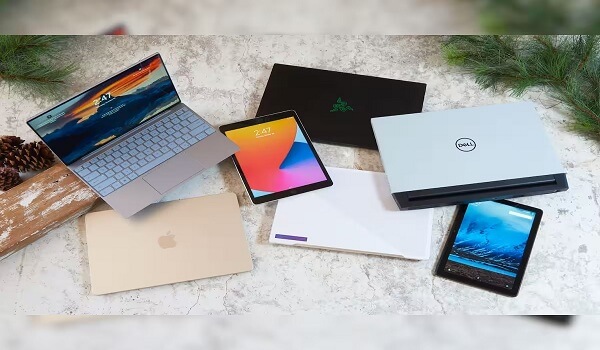The central government banned all imports of laptops, tablets, all-in-ones and small-factor personal computers or PCs from 3 August 2023, requiring a license to bring these products into the country and sell them to consumers.
In the notification, the Directorate General of Foreign Trade (DGFT) said that import of computers and other items under seven categories of HSN code 8471 has been prohibited.However, there will be no restriction on import under baggage rules.The new rule mandates a special license for these products, similar to the restrictions imposed in 2020 for inbound TV shipments to India.
The Directorate General of Foreign Trade (DGFT) said in a notification that “up to 20 items per consignment are exempted from import licensing for research and development, testing, benchmarking and evaluation, repair and recall, product development purposes. However, such imports shall be for use only for the stated purposes and not for sale.”Import of a laptop, tablet, all-in-one personal computer or ultrasmall form factor computer including computer purchased from an e-commerce portal through post or courier is exempted from the requirement of license. It states that the applicable fee will have to be paid on this.The government has also exempted laptops, tablets, all-in-one personal computers and ultrasmall form factor computers from import license requirements if they are an essential part of capital goods.It also said that as per the Foreign Trade Policy, the return of repaired and re-imported goods repaired abroad would not require a Restricted Import License.
Promotion of domestic companies
- The move is aimed at boosting domestic manufacturing and is likely aimed at China, as over 75 per cent of India’s total imports of laptops and personal computers in 2022-23 were to the tune of $5.33 billion.
- The country has in the past also imposed high tariffs on products such as mobile phones to encourage domestic production.
- Prime Minister Narendra Modi’s government is promoting local manufacturing and discouraging imports as part of its “Make in India” plan.
- India has been providing incentives to companies in recent years to promote domestic production. The initiative has successfully attracted a large number of smartphone makers and is now rapidly gaining interest from chip makers and semiconductor producers.
- In May 2023, the Narendra Modi government launched a $2 billion scheme aimed at promoting businesses that locally manufacture hardware such as laptops, PCs, servers and related edge computing kits. The plan was an upgrade to a previous program under which the government was set to spend $892 million.
- With the announcement of PLI for this sector, domestic manufacturing of these IT hardware accessories will see a significant increase.
- The move is meant to motivate companies to manufacture locally in India, as the country looks to strengthen its domestic production capacity in the electronics sector.
- The move boosted the morale of domestic laptop assembly companies.
- HP and Lenovo have also started local production of some of their laptops.
- In July 2023, Reliance Jio unveiled a SIM-connected, laptop-style e-learning device, known as JioBook, that allows users to browse the Internet and supports all learning endeavors .
- Videotex said that this move highly encourages the creation of an entire manufacturing ecosystem in the country.
Goal of making global economic production center
- India is trying to promote local manufacturing by offering production-linked incentives in more than two dozen sectors, including electronics.
- The Modi government has extended the deadline to apply for a $2 billion stimulus plan launched for companies to attract large investments in IT hardware manufacturing, which includes products such as laptops, tablets, personal computers and servers. .
- The plan is key to India’s ambitions to become a powerhouse in the global electronics supply chain, with the country targeting an annual output of $300 billion by 2026.

